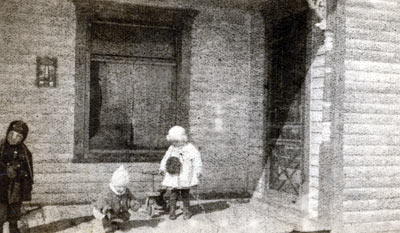
I spent the evening giving my grandmother's book a final going over -- one last proofread before it goes to the press where we'll have it self-published.
My maternal grandmother is a very matter of fact woman who has laid down the story of her life -- as a child in Hoisington, Kansas who crossed the country with her family to McCloud, California during the Depression once the dust got so bad that the birds stopped flying, the sky went black, and the jack rabbits ran rampant down Main Street -- in a very matter of fact way.
And yet it never fails to make my heart ache by the time I’m done giving it a read.
Being her granddaughter probably has something to do with it: Her history is my history, so it matters just a little bit more.
But she also pulls off some passages that leave me speechless.
Speaking of a visit to the home of the landlord from whom the family leased their farmland in Kansas to pay the rent:
One day it was my turn to go along and I was so impressed by a large glass cup just filled with sharpened pencils. I never forgot it. I only had one or two pencils to last me the entire school year. My idea of wealth was to be able to own plenty of pencils.
Writing about the weather that would change the course of her life:
Then in 1931 when I was 10 years old, the rains stopped....
The dust storms began. The dust was as fine as face powder and almost black in appearance. It invaded every space....
I remember my Dad driving on the way home in the afternoon and the wind was blowing so hard and the dust was so thick and black it was like driving in the middle of the night. It was difficult to stay on the road. My Dad had to follow the fence posts to find his way home. The dust filtered into our Model A Sedan. It was scary and difficult to breath.
What she found in California was a mixed bag. Her family settled in McCloud where her father at first worked at a lumber mill, but her father, being a farmer, preferred to work out of doors, and so he took his family packing to pick fruit in the fields around Modesto.
In high school she lived with a family in McCloud so that she could finish school; when summer came she joined her family in the trailer her father had made and worked the fields and in a cannery. She loved her life in McCloud and was deeply ashamed of the poverty of her family’s life in Modesto. She writes:
Now is when it gets hard to write as this was a most difficult time in my life. If you can just imagine being fifteen years old, soon to turn sixteen on July 17, and no place to call home. All ten of us were traveling in one car pulling a homemade trailer with all our wordly possessions. We were planning to go from place to place to pick fruit on our way to our final destination of Modesto....
It would be hard for anyone who has not lived through this difficult time in our history to understand the tremendous amount of unemployment, poverty and homeless people. Camps were set up everywhere. Laundry was always hanging from ropes or fences. Small children were playing in the dirt.
The town people and fruit growers really didn’t want these “Oakies” (everyone was called the despised name of “Oakie” regardless of which state you were from). They only wanted cheap labor in their orchards to pick their fruit and now they didn’t know what to do with all the “Oakies” from the Dust Bowl.
Excerpted from «My Story: A Memoir» by Elva Marie Rathbun Gooch, aka my Nini.






1 comment:
Congratulations on the book! It is a family treasure to have all that information put together in such a meaningful way.
Post a Comment